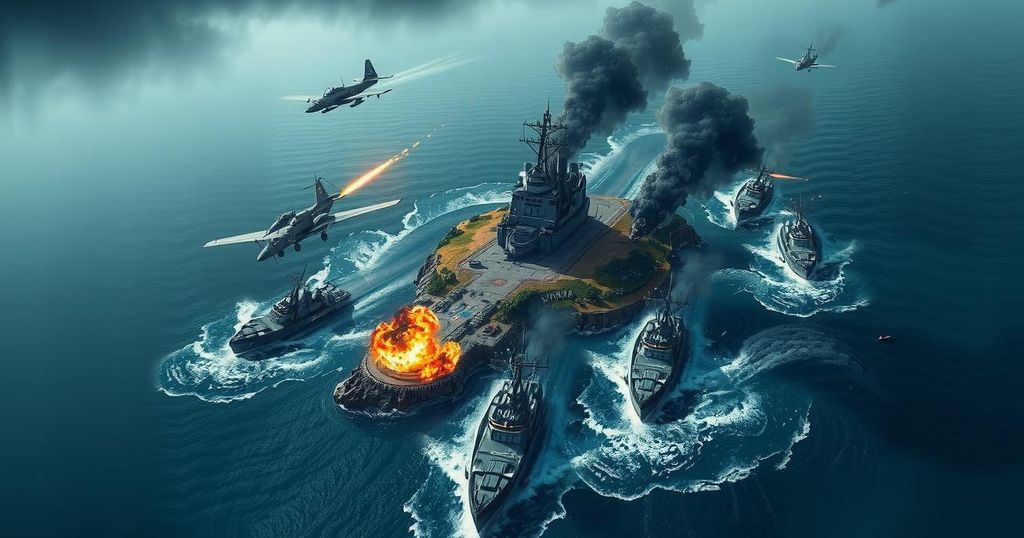Politics
AMERICA, ASIA, CHINA, CNN, DEFENSE, DONALD TRUMP, EASTERN THEATER COMMAND, EUROPE, GEOPOLITICS, HONG KONG, INDO - PACIFIC, JOSEPH WU, MEXICO, NORTH AMERICA, PEOPLE ’ S LIBERATION ARMY, PETE HEGSETH, PLA, SHANDONG, SOUTH CHINA SEA DISPUTE, TAIPEI, TAIWAN, TERRITORIAL DISPUTES, TRUMP, UNITED STATES, US, US-CHINA RELATIONS, WASHINGTON, WELLINGTON KOO
Nia Simpson
China Conducts Military Drills Around Taiwan Amid Rising Tensions
The Chinese military has launched joint exercises around Taiwan, deemed a “stern warning” following U.S. Defense Secretary Pete Hegseth’s comments on countering China’s assertiveness. These maneuvers include simulations of maritime assaults and blockades, viewed by Taiwan as threats. Official statements highlight Taiwan’s condemnation of the drills while stressing the importance of regional stability amid rising tensions.
On Tuesday, the Chinese military commenced joint military exercises encompassing army, navy, air force, and rocket force components around Taiwan. This act is characterized as a “stern warning” following U.S. Defense Secretary Pete Hegseth’s commitment to countering “China’s aggression” during his initial visit to Asia. The People’s Liberation Army (PLA) stated that its operations aim to test the joint capabilities of its forces while asserting its stance against Taiwan’s independence aspirations.
The drills involve a comprehensive approach, as forces will simulate assaults on maritime and ground targets as well as blockades of vital sea routes. China emphasizes that these operations are legitimate actions to protect its sovereignty and national integrity. In juxtaposition, Taiwan perceives these maneuvers as a direct threat from China, which maintains territorial claims over the island, vowing to reclaim it by force if necessary.
Taiwanese officials have condemned the military exercises, characterizing them as “reckless” and “irresponsible”. Joseph Wu, secretary-general of Taiwan’s National Security Council, criticized the drills as unjustifiable and in violation of international laws. Taiwan’s Defense Minister Wellington Koo affirmed that the military remains vigilant, monitoring the movements of a Chinese aircraft carrier group in close proximity to the island.
The PLA has released a video highlighting its naval and air exercises around Taiwan, showcasing various military actions in the northern, southern, and eastern waters. Although the duration of these exercises is unspecified, they contribute to the increasing tensions in the region.
During Hegseth’s Asia visit, he reiterated the importance of strengthening military alliances with countries like the Philippines and Japan to counteract Chinese military aggressiveness. An internal analysis from Taiwan’s government links Hegseth’s visit to the timing of the Chinese drills, suggesting they demonstrate the heightened security focus of the U.S. in the Indo-Pacific.
Increased regularities of military exercises by the Chinese military around Taiwan since Xi Jinping assumed leadership illustrate a growing assertiveness in the region. These actions serve both as a message to Taiwan and a mechanism for China to gauge Taiwan’s defensive responses. The drills have become routine, with a PLA official stating that such activities do not carry specific names since they have become normalized.
Taiwan’s President Lai Ching-te has condemned Chinese intimidation, emphasizing the need for sustained peace and stability across the Taiwan Strait. Public sentiment in Taiwan shows a strong preference against being governed by Beijing. Recent incidents, including a cargo ship situation involving detained Chinese crew members, have further escalated tensions between the two authorities.
The United States, maintaining unofficial relations with Taiwan, is obligated by law to provide defense support. However, its policy on whether to intervene in case of a Chinese aggression remains strategically ambiguous. The ongoing military assertiveness by China keeps Taiwan at the center of potential U.S.-China tensions, making the island a critical focus in discussions of international stability and security.
In summary, the recent military drills conducted by China around Taiwan serve as a pointed reminder of the ongoing tensions between the island and its powerful neighbor. With assertive maneuvers reflecting China’s territorial ambitions and a response to U.S. policy shifts, Taiwan remains vigilant. The complex dynamics underscore the necessity for dialogue and stability in the Taiwan Strait, amidst the backdrop of U.S.-China relations that continue to evolve.
Original Source: www.applevalleynewsnow.com








Post Comment